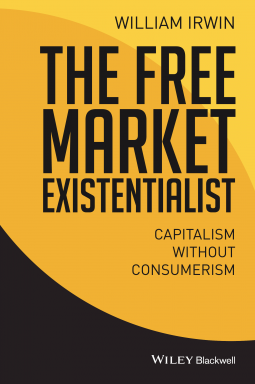Before I picked up this book, I had no idea what an Existentialist is and a very limited understanding of Marxism or Capitalism. However, I was very keen to understand the arguments that the author makes in this book.
Capitalism has clearly won the argument of the early 20th century and America is the shining example of its success. While Capitalism may not be as evil as Marx or other socialists envisaged then, it has also given birth to consumerism, which drives masses toward false pride and immense debt.
William Irwin is Herve A. LeBlanc Distinguished Service Professor and Chair of Philosophy at King’s College in Pennsylvania. He is the author of Intentionalist Interpretation and scholarly articles on Sartre, Nietzsche, and Heidegger. Irwin originated the philosophy and popular culture genre of books with Seinfeld and Philosophy in 1999 and is currently the General Editor of The Blackwell Philosophy and Pop Culture series.
 The Free Market Existentialist: Capitalism without Consumerism
The Free Market Existentialist: Capitalism without Consumerism
Author: William Irwin
Pages: 216 pages
Publisher: Wiley; 1 edition (October 26, 2015)
ISBN: 1119121280, 978-1119121282
Which offers most freedom: Socialism or Capitalism? Easy, right? But what if we couple consumerism as an inalienable part of Capitalism. Then, Capitalism makes people as much subservient to external forces as Socialism.
Is being Free Market Existentialist then the answer to our plight?
The author begins the book with his definition of Existentialism and his views on Freedom and Will. Sartre Kierkgaard, Neitzche are considered the pioneering Existentialists. Sartre’s embrace of Marxism in his later life seems to have placed Existentialism closer to Marxism.
In chapter 2, the author digs deeper into this connection between Sartre and Marxism and the meaning of Existentialist Socialism. He argues that Existentialism is much more closer to free market capitalism than Marxism.
Similarly, the author examines Authenticity, Moral, Property Rights, and Taxes from each of the different lenses and makes an argument toward how Existentialism is the core of Capitalism.
Reviving the individual and helping her define herself, rather than arriving at a definition driven by consumerism, will give us the best of Capitalism and Free Market philosophy.
If these are some of the issues you grapple with often, you will love to read what some of the 20th Century philosophers argued. The author’s approach or solution to today’s love-hate relationship with Capitalism and its ills will perhaps even appeal to you and spark the independent individual sitting in the corner.
Although a bit difficult to digest for a reader who is not interested in philosophy, the book is sure to spark interest in readers who love to talk about the hues of Capitalism and Socialism. It will also interest you if you ever ponder over the meaning of being Free or wonder if the Will is free.